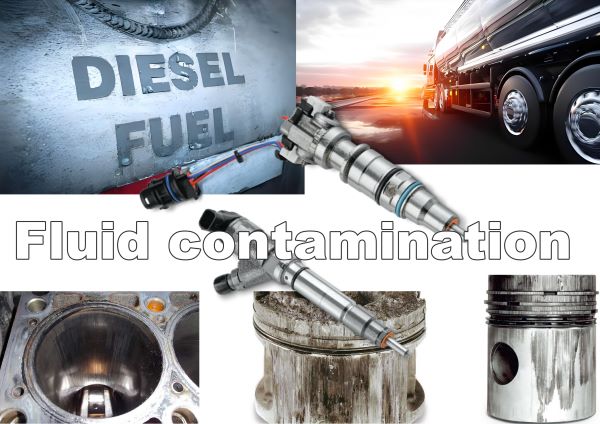Oil analysis is critical to monitor diesel engine combustion efficiency
Diesel engines are the driving force powering many modern transportation and industry applications. Efficient engine function relies heavily on the combustion process that converts fuel into mechanical energy. High-quality combustion is crucial for optimal engine performance and overall reliability, comments Craig FitzGerald from ISO-Reliability Partners.
The company is an own emblem manufacturer (OEM) of class-leading micro fine oil filtration solutions, diesel purity testing, vacuum dehydration systems, automated water removal for compressed air and high efficiency industrial air scrubbing. ISO-Reliability excels in providing its customers with reduced equipment failure and increased production efficiencies.
“The majority of our clients are manufacturing facilities, general industry and mining. Our unique solutions and products are suited to any large-scale user of gearboxes, diesel equipment, industrial or mobile machinery,” says FitzGerald. “Our solutions outshine in high speed, extreme load, high temperature and high contamination applications. We have a vast trove of unique industrial solutions that aid in eliminating equipment failures and dramatically improving reliability and availability.”
When oil or diesel is purchased, it already holds unacceptably high levels of contaminants. OE filters are not capable of removing these fine particles, leading to high equipment failure rates. To achieve equipment reliability and eliminate machine failures it is becoming essential to focus on fine contaminant removal within the 1-to-4-micron range.
ISO micro fine filtration systems address and remove the fine contaminants found in diesel and oil fluid systems, which regular in-line OE filters are incapable of removing. It is these particles which are the leading cause of high internal wear rates and assured equipment breakdowns.
FitzGerald highlights that oil analysis is valuable for acquiring important information about the lubricant condition, internal wear rates and contamination. Knowing what is happening inside the equipment enables early failure detection for timely intervention. Regular in-service engine oil analysis detects most of these issues, provided that a dedicated oil analysis program is in place. In recent times, real-time oil analysis technologies are creating a buzz in the market, due to their ability to further reduce the detection time for potential faults and indicators of equipment failure.
In its drive for excellence in machine performance and uptime, ISO-Reliability has partnered with Yateks®, a technological leader in the manufacture of real-time oil quality sensors which meet the highest standards of industrial oil analysis; and provides un-rivalled machine and engine protection.
With oil analysis data, maintenance managers or workshop supervisors can strategically plan interventions or conduct minor corrective maintenance actions instead of triggering a major intervention on the equipment. 92% of all lubricated component failures can be attributed to fluid contamination, and as we have highlighted, regular in-line OE filters are incapable of removing the damaging contaminants. In high pressure common-rail diesel engines, fluid contamination is the primary cause leading to indicators such as fuel dilution and soot formation. These indicators are a result of incomplete combustion due to improper fuel atomisation; caused solely by fine fluid contamination.
Excessive soot content in engine oil signals potential issues with the components involved in combustion. These can be injection problems, prolonged oil drain intervals, low compression, or a high fuel/air ratio and cold air temperatures, points out FitzGerald.
Fuel dilution occurs when the quantity of unburned fuel in engine oil increases. A high fuel dilution rate indicates abnormal fuel atomisation at the point of injection. Instead of a fine well dispersed mist, jets of diesel do not combust fully, allowing unburnt diesel to pass the piston rings and thin engine oil viscosities, leading to an inability for the oil to protect lubricated components.
With high fuel present in the oil, the lubricant’s viscosity becomes too low, reducing overall lubricating effectiveness. This phenomenon is often associated with raw or unburned fuel mixing with the oil resulting from incomplete combustion, worn injectors, or improper fuel/air ratio.
Since poor combustion quality is connected with engine oil degradation, mitigating the issue begins by using suitable micro fine filtration and adhering to the recommended oil change frequency. Countermeasures to remedy failure rates involve using good fuel quality, improving filtration levels, checking air intake cleanliness and monitoring injector performance.
ISO-Reliability Partners offers a comprehensive value proposition centred around enhancing machine efficiency and reliability. It leverages deep expertise to unlock significant value that might otherwise be lost in industrial processes. It also supplies cutting-edge lubrication management, including the use of Royal Purple ultra-high-performance lubricants, which improves equipment protection and reduces energy consumption.
FitzGerald reveals that the company is developing a predictive maintenance platform powered by AI for real-time equipment monitoring, early fault detection and reduced human interaction with machinery, thereby enhancing safety and efficiency. “Our focus is on innovative solutions to improve efficiency and reduce wastage, addressing critical concerns like energy security,” he concludes.




